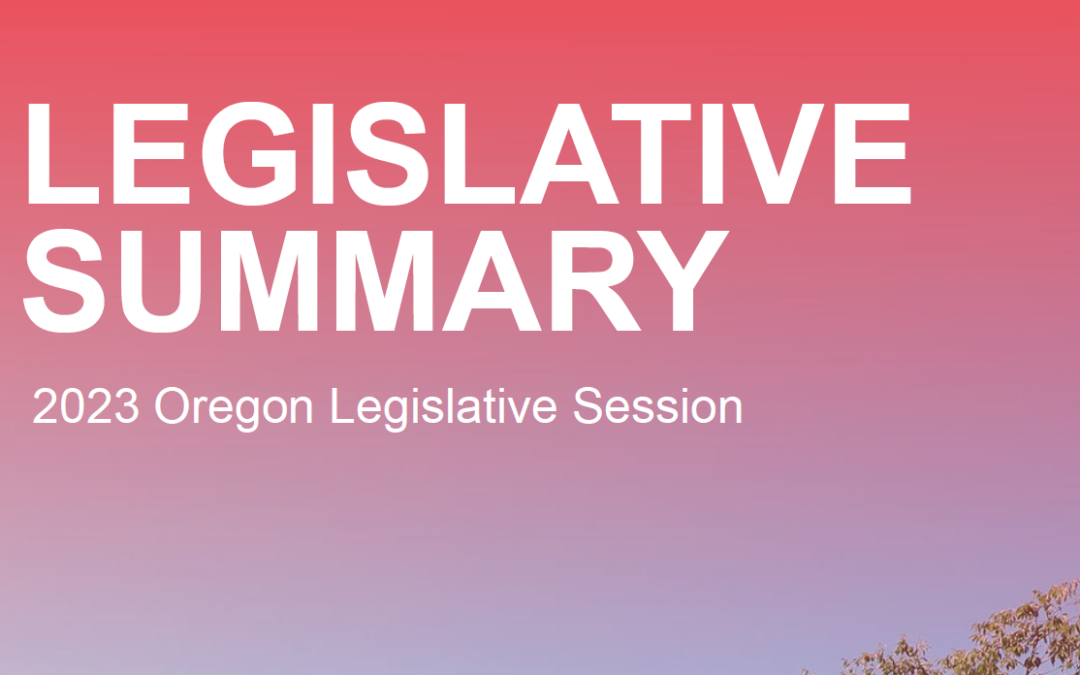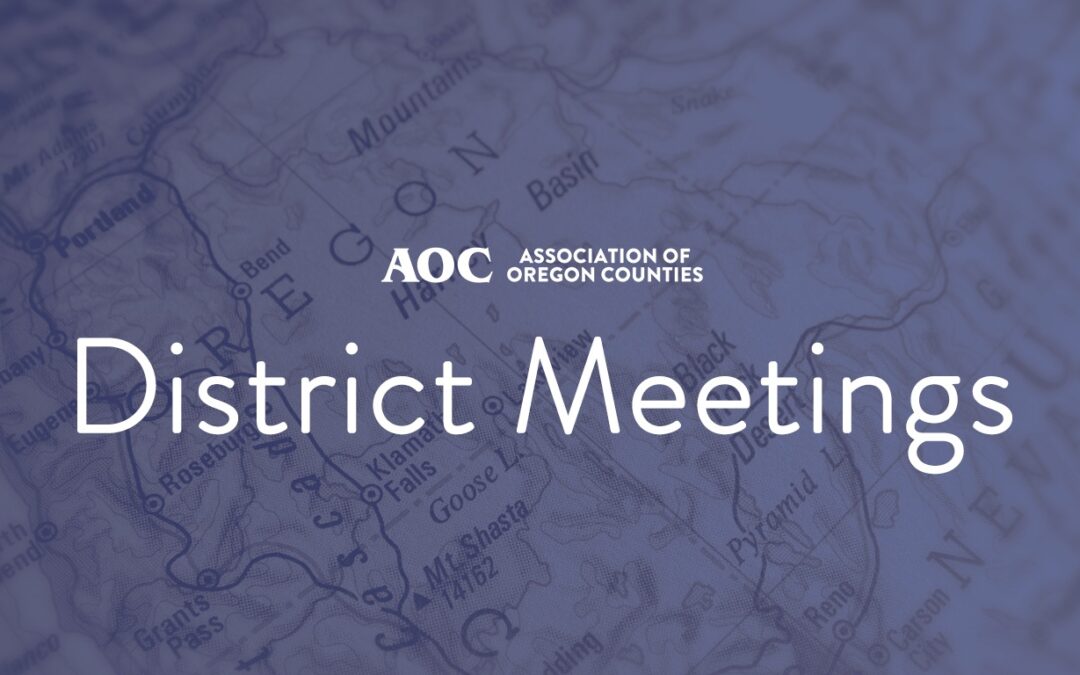
Aug 28, 2023 | AOC News
With the governor’s signing of Senate Bill 80 (2023) in July, the Oregon Department of Forestry (ODF) and Association of Oregon Counties (AOC) began to put in motion a month-long statewide outreach effort to incorporate county input and expertise into a new Wildfire Hazard Map.
AOC successfully advocated for this increased county involvement and representation in the mapping process during the 2023 legislative session and hopes these efforts will result in a well-received and accurate final product.
Pursuant to statute, ODF and AOC will host eight regional Wildfire Hazard Map meetings throughout the state beginning the first week of September, in conjunction with AOC’s eight annual district meetings.
Two weeks prior to their scheduled meeting each region will be provided a draft map for review by county technical staff – planning directors, emergency managers, and administrators.
During the meetings, ODF and state agency representatives will walk through identified areas of concern with county representatives. ODF will provide reasoning for any areas of concern that are unable to be alleviated.
These Wildfire Mapping County Meetings are broken down in the following way.
- AOC District 5: Benton, Lane, and Linn County
- Friday, September 8 in Eugene (Lane County).
- AOC District 7: Clatsop, Columbia, Lincoln, and Tillamook County
- Friday, September 15 in Tillamook (Tillamook County).
- AOC District 4: Coos, Curry, Douglas, Josephine County
- Monday, September 18 in Grants Pass (Josephine County).
- AOC District 2: Crook, Deschutes, Harney, Jefferson, Klamath, and Lake County
- Thursday, September 21 in Klamath Falls (Klamath County).
- AOC District 3: Gilliam, Hood River, Morrow, Sherman, Wasco, and Wheeler County
- Thursday, September 28 in Moro (Sherman County)
- AOC District 1: Baker, Grant, Malheur, Umatilla, Union, and Wallowa County
- Friday, September 29 in Pendleton (Umatilla County)
- AOC District 8: Washington, Multnomah, and Clackamas County
- Wednesday, October 4, in Hillsboro (Washington County)
- AOC District 6: Marion, Polk, and Yamhill County
- Friday, October 6, in Dallas (Polk County)
Governor Kotek has directed all the necessary and appropriate individuals from the executive branch to travel to each regional meeting to participate in person and ensure a thorough and productive process. AOC expects the following state partners to join county commissioners and staff:
Oregon Department of Forestry:
- Cal Mukumoto; State Forester (Availability limited)
- Derrick Wheeler; Legislative Coordinator
- Tim Holschbach; Deputy Chief, Policy and Planning
- Derek Gasperini; Public Affairs Officer
Oregon State University:
- Chris Dunn; Research Associate, Department of Forest Engineering
- Andy McEvoy; Research Assistant
Oregon State Fire Marshal:
- Mariana Riuz-Temple; State Fire Marshal
- Claire McGrew; Fire Protection Risk Administrator
- Chad Hawkins; Fire Protection Risk Manager
Department of Consumer and Business Services:
- Andrew Stolfi, Director and Chief Insurance Officer, DCBS
- Alex Chang; Deputy Administrator DCBS
- Eric Cutler; Section Manager, DCBS
- Alana Cox; Building Codes Division Administrator
- Eric McMullen; Senior Building Code Specialist
Contributed by: Branden Pursinger | Legislative Affairs Manager

Aug 28, 2023 | AOC News
Oregon Housing and Community Services (OHCS) unveils the County Profiles data dashboard, a tool that provides key data about housing dynamics in the state. The County Profiles aims to tell a comprehensive story about housing in Oregon while addressing questions frequently posed to the agency regarding affordable housing, home purchasing costs, and homelessness.
OHCS uses data to inform policy solutions. The agency created these profiles to provide information about various topics connected to housing, such as the race and gender of people living in poverty or the population of a specific county.
Each County Profile has five data sections:
- Population
- Poverty
- Homeownership
- Rental Housing
- Homelessness
The data is primarily sourced from the US Census Bureau’s annual surveys. The dashboard presents many of these statistics by race, ethnicity, and gender when the data is available.
The dashboard will be updated annually and continue to evolve to improve transparency. Individuals, organizations, and policymakers are urged to explore the County Profiles and email feedback, questions, or recommendations to hcs_research@hcs.oregon.gov.
Contributed by: Jessica Pratt | Legislative Affairs Manager

Aug 21, 2023 | AOC News
The Association of Oregon Counties (AOC) has hired Jennifer Lewis-Goff as a legislative affairs manager. Her portfolio will cover issues related to public safety, veterans services, and community development.
Lewis-Goff comes to AOC with nearly 15 years of diverse experience in policy analysis, advocacy, and member association management. She brings established relationships and demonstrated success in coalition building in the Oregon State Legislature and will be an asset to the association.
“AOC is excited to have Jen on the county team. I know she will be a great fit for our organization and will effectively elevate the county voice with our partner agencies and organizations,” said Gina Firman Nikkel, AOC executive director, of the hire.
Lewis-Goff will complete AOC’s Legislative Affairs team, joining Mallorie Roberts, who serves as the association’s legislative director (covering transportation policy); and legislative affairs managers: Michael Burdick (governance, revenue, and economic development), Branden Pursinger (natural resources and land use), and Jessica Pratt (health and human services).
Lewis-Goff’s first day is September 1, 2023.
Contributed by: Mallorie Roberts | Legislative Affairs Director

Aug 17, 2023 | AOC Advocacy, AOC News
The 2023 AOC Legislative Summary is a comprehensive report that describes the outcomes of the Association of Oregon Counties’ top legislative priorities and provides a detailed overview of each piece of legislation on which the AOC Legislative Committee took a position during Oregon’s 82nd Legislative Assembly.
Over 2000 bills were introduced this session and 697 were passed into law. The AOC Legislative Affairs Team lobbied for/against 189 concepts and submitted fiscal impact statements on over 500 proposals with potential impact to county budgets.
The strategic input, lobbying efforts, and technical expertise from commissioners, chairs, judges, and county staff this session was critical to AOC’s ability to advocate successfully on behalf of all of Oregon’s counties in the State Capitol. Together we secured significant policy and budgetary wins, built meaningful relationships with key state leaders, and advanced the state-county partnership.
The AOC Legislative Summary was emailed to the membership in PDF form, a hard copy was mailed to each county, and it can be found at www.orgeoncounties.org.
Click here to view the 2023 AOC Legislative Summary.
Contributed by: Mallorie Roberts | Legislative Affairs Director

Aug 15, 2023 | AOC News
Each year, the Association of Oregon Counties (AOC) holds eight district meetings where AOC’s member counties gather with regional partners for collaboration and knowledge sharing on the most important issues facing their communities. These meetings are typically held in-person, and hosted by a member county within the district.
District counties and meeting details are as follows:
District 1
- Baker, Grant, Malheur, Umatilla, Union, Wallowa
- Date: September 29; Time: 10:00 a.m. – 2:00 p.m.
District 2
- Crook, Deschutes, Harney, Jefferson, Klamath, Lake
- Date: September 21; Time: 10:00 a.m. – 2:00 p.m.
District 3
- Gilliam, Hood River, Morrow, Sherman, Wasco, Wheeler
- Date: September 28; Time: 10:00 a.m. – 2:00 p.m.
District 4
- Coos, Curry, Douglas, Josephine
- Date: September 18; Time: 10:00 a.m. – 2:00 p.m.
District 5
- Benton, Lane, Linn
- Date: September 8; Time: 10:00 a.m. – 2:00 p.m.
District 6
- Marion, Polk, Yamhill
- Date: October 6; Time: 10:00 a.m. – 2:00 p.m.
District 7
- Clatsop, Columbia, Lincoln, Tillamook
- Date: September 15; Time: 10:00 a.m. – 2:00 p.m.
District 8
- Clackamas, Multnomah, Washington
- Date: October 4; Time: 10:00 a.m. – 2:00 p.m.
Additional meeting information can be found here.
Contributed by: Mckenzie Farrell | Operations Director

Jun 27, 2023 | AOC News
National Association of Counties Commission on Mental Health and Wellbeing Amplifies Message at White House, on Capitol Hill
As a member of the National Association of Counties (NACo) Commission on Mental Health and Wellbeing, Gina Firman Nikkel, Ph.D, advocated last month in Washington, D.C. for policy priorities around mental and behavioral health. The commission also released new research highlighting county perspectives on this national crisis.
Part of Mental Health Awareness Month efforts, on May 10, the group joined the White House State and Local Partners Forum on Mental Health and Wellbeing, and on May 11, the commission met on Capitol Hill with the Bipartisan Mental Health Caucus and the Bipartisan Addiction Task Force. The commission shared crucial county perspectives geared towards strengthening the intergovernmental partnership and urging action to achieve shared goals.
“Counties in Oregon are the boots on the ground – and by law – the local mental health authority. We must continue to present the whole story of what is needed to coordinate and deliver an effective local continuum of care. This care should be driven by science not profit. It should be driven by people experiencing mental health challenges and addiction not commercialization. And, it should be driven by compassion not apathy,” stated Nikkel.
The commission released new data based on a survey of over 200 U.S. counties, with findings focused on the mental health landscape in counties and the areas of greatest need. Key takeaways from the research include:
- The nation is facing an acute escalation of the mental and behavioral health crisis.
- Seventy-five percent of counties reported an increase in incidence of behavioral health conditions in the last year, and 89 percent reported an increase compared to five years ago.
- Youth behavioral health needs are at the forefront of the crisis.
- Two-thirds (67 percent) of counties reported that youth behavioral health conditions are “definitely a problem” or “very prevalent and/or severe.”
- Limited access to services inhibits county residents from receiving the help they need.
- Seventy-four percent of counties cited financial costs as a barrier to expanding access to behavioral health services, and 71 percent cited lack of direct service providers.
- The crisis is exacerbated by a lack of behavioral health workers.
- Nearly three-quarters (72 percent) of counties consider the shortage of behavioral health workers in their county to be “definitely a problem” or “a severe problem.”
- The financial and human costs of behavioral health are compounding across all county systems.
- Eighty percent of counties indicated that they incurred associated costs in the legal system (courts and jails), 77 percent indicated associated costs in law enforcement, and 54 percent indicated associated costs in the health system and hospitals.
“This data released on behavioral health conditions by the NACo Mental Health Commission is significant and supports what our counties are experiencing on the ground in their communities. We must tackle the workforce shortages, unfair policies, and the risks of profit over personalized care,” stated Nikkel.
The new research pairs key findings with associated policy objectives, including:
- Amending detrimental policies under Medicaid, like the Medicaid Inmate Exclusion Policy (MIEP) and the Institutions for Mental Diseases (IMD) exclusion
- Obtaining direct and flexible resources to support the recruitment, training and retention of a sufficient behavioral health workforce
- Enhancing the intergovernmental partnership for the development and modernization of local crisis response systems and infrastructure, and
- Enforcing policies that ensure equitable coverage for treatment of mental illness and addiction.
The events last month marked the first in-person meeting of NACo’s Commission on Mental Health and Wellbeing since it was announced in February. The group is focused on building urgency, awareness, and crucial partnerships around the mental health crisis in America, with plans to release in-depth policy and programmatic recommendations in early 2024.
For more information about NACo’s Commission on Mental Health and Wellbeing, click here.






